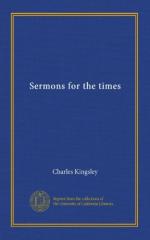And is it not, on the other hand, establishing a righteousness of one’s own, to say that God requires of us belief in certain doctrines about election, and ‘forensic justification,’ and ‘sensible conversion,’ and certain ’frames and feelings and experiences;’ and that without all these a man has no right to expect anything but endless torture; and all the while to say little or nothing about God’s requiring of men the Ten Commandments? For my part, I am equally shocked and astonished at the doctrine which I have heard round us here—openly from some few, and in practice from more than a few—that because the Ten Commandments are part of the Law, they are done away with, because we are not now under the Law but under Grace. What do they mean? Is it not written, that not one jot or tittle of the Law shall fail; and that Christ came, not to destroy the Law, but to fulfil it? What do they mean? That it was harm to break the Ten Commandments before Christ came, but no harm to break them now? Do they mean that Jews were forbid to murder, steal, and commit adultery, but that Christians are not forbidden? One thing I am afraid they do mean, for I see them act up to it steadily enough. That Jews were forbidden to covet, but that Christians are not; that Jews might not commit fornication, but Christians may; that Jews might not lie, but Christians may; that Jews might not use false weights and measures, or adulterate goods for sale, but that Christians may. My friends, if I am asked the reason of the hypocrisy which seems the besetting sin of England, in this day;—if I am asked why rich men, even high religious professors, dare speak untruths at public meetings, bribe at elections, and go into parliament each man with a lie in his right hand, to serve neither God nor his country, but his political party and his




